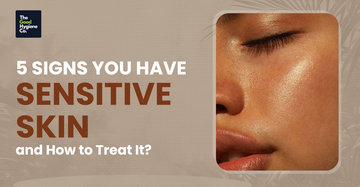Does your skin sting when you try a new product? Or flush red after a short time in the sun? You might have sensitive skin, a common but often misunderstood condition. Sensitive skin isn't just about occasional irritation; it’s a reactive skin type that needs care and attention.
Let’s explore the most common signs of sensitive skin, what causes it, and how to manage it with gentle, effective solutions.
1. Your Skin Feels Dry, Tight, or Rough
Dryness is one of the earliest and most consistent signs of sensitive skin. You might feel tightness after washing, rough patches that flake, or an overall lack of softness.
Why it happens:
Sensitive skin often has a compromised skin barrier, which means it loses moisture quickly and becomes more vulnerable to irritants [1].
How to manage it:
- Use a fragrance-free, hypoallergenic moisturizer to restore hydration.
- Avoid hot water and opt for lukewarm showers to prevent further dryness.
-
Choose sensitive skincare products with organic ingredients, ceramides or hyaluronic acid to strengthen your barrier.
2. Redness and Flushing Are Frequent Visitors
People with sensitive skin often notice redness in the form of blotches, rashes, or flushing. This can appear on the cheeks, around the nose, or even all over the face.
Why it happens:
Sensitive skin is often triggered by weather conditions (like sun, wind, heat, or humidity) and a wide range of topical products, including cosmetics, skincare, household cleaners, and hygiene items. Even fabrics and garments can contribute to skin sensitivity [2].
How to manage it:
- Use calming ingredients like aloe vera or niacinamide.
-
Apply a broad-spectrum sunscreen (SPF 30+) with zinc oxide or titanium dioxide, which are less likely to cause irritation.
3. Stinging, Burning, or Irritation with Products
One of the defining signs of sensitive skin is experiencing discomfort like burning, tingling, or stinging when using certain skincare or cosmetic products.
Why it happens:
Sensitive skin often reacts to fragrances, alcohol, or preservatives. Even “natural” ingredients can be irritating.
How to manage it:
- Switch to skincare for sensitive skin that’s labeled fragrance-free and non-comedogenic.
-
Always patch-test a product on your inner arm before applying it to your face.
4. Rashes and Breakouts Happen Easily
Whether it’s a rash, redness, or breakouts that look like acne, sensitive skin can react with inflammation soon after contact with a trigger.
Why it happens:
The weakened skin barrier allows irritants in and creates inflammation, leading to itchy rashes or red bumps.
How to manage it:
- Avoid harsh exfoliants and foaming cleansers.
- Use sensitive skincare products with minimal ingredients.
-
Don’t self-treat with acne products unless directed by a dermatologist, many contain ingredients too harsh for sensitive skin.
5. You Sunburn Quickly and Easily
If you have rosacea or sensitive skin, your skin likely reacts strongly to sun exposure. UV rays can trigger flare-ups, increase redness, and further weaken the skin barrier [3].
Why it happens:
A damaged skin barrier can't defend well against environmental factors like sunlight, wind, or pollution.
How to manage it:
- Apply a mineral sunscreen daily with SPF 30 or higher.
-
Look for physical sunscreens containing zinc oxide or titanium dioxide — safer options for sensitive skin.
What Causes Sensitive Skin?
The causes are complex and vary from person to person. Some key contributors include:
- Weakened skin barrier with reduced ceramides and intercellular lipids
- Neurosensory changes leading to heightened responses to stimuli (TRPV1 upregulation)
- Environmental triggers such as climate, pollution, water temperature, and even fabrics
-
Personal care products with alcohol, fragrances, or certain preservatives
Studies show that hot water and long showers can further impair the skin barrier, increasing TEWL (transepidermal water loss) and inflammation [4].
Treating Sensitive Skin: Best Practices
To support and protect sensitive skin, follow these expert-backed strategies:
- Identify Triggers: Keep a journal to track products or environments that cause flare-ups.
- Simplify Your Routine: Fewer ingredients = fewer risks.
- Use Gentle, Fragrance-Free Products: Choose sensitive skincare products with skin-soothing ingredients.
- Moisturize Daily: Strengthens the skin barrier and reduces dryness.
- Avoid Hot Water: Use lukewarm water for showers and handwashing.
-
See a Dermatologist: Persistent issues deserve professional care, your skin may need a personalized regimen.
Final Thoughts
If you're noticing signs like redness, dryness, or frequent irritation, don’t ignore them. These could be clear signs of sensitive skin, and addressing them early can help prevent further damage. With the right care and the right skincare for sensitive skin, you can restore comfort, resilience, and radiance.
Start by simplifying your routine and being mindful of ingredients. Because when it comes to sensitive skin, less is often more.
Explore sensitive skincare products by TGHC.
References
-
Compromised Skin Barrier and Sensitive Skin in Diverse Populations
https://pubmed.ncbi.nlm.nih.gov/33852256/
-
The Prevalence of Sensitive Skin
https://pmc.ncbi.nlm.nih.gov/articles/PMC6533878/
-
Impact of ultraviolet radiation and exposome on rosacea: Key role of photoprotection in optimizing treatment
https://pmc.ncbi.nlm.nih.gov/articles/PMC8596706/
-
Impact of Water Exposure and Temperature Changes on Skin Barrier Function
https://pmc.ncbi.nlm.nih.gov/articles/PMC8778033/






